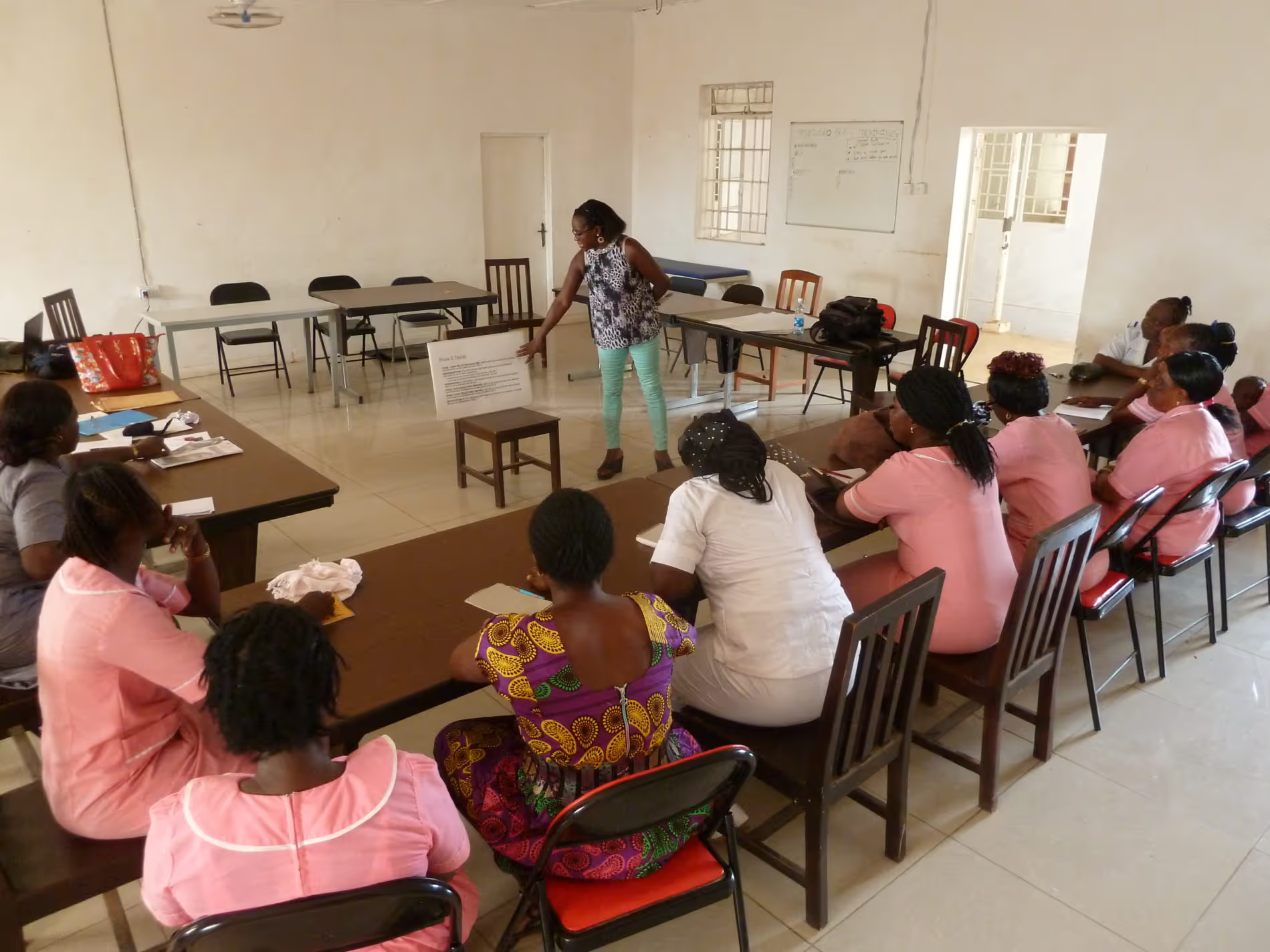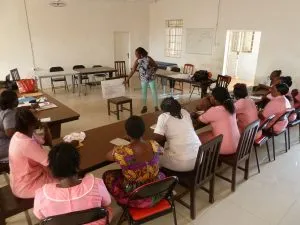Sharing of research findings in Sierra Leone

Strengthening Evidence for the Scaling of Psychological First Aid in Humanitarian Settings Sharing the findings in Sierra Leone
Our Elrha funded study on the ways in which Psychological First Aid (PFA) contributed to the support of people in distress in Sierra Leone took place between 2016 and 2018, and I acted as the research lead, along with Dr. Rebecca Esliker at the University of Makeni, for four periods of data collection during that time. The first phase of the project was a qualitative study, looking back at how PFA was used during the outbreak of the Ebola Virus Disease (EVD) in Sierra Leone. The second phase of the project, conducted during 2017, was a randomised controlled trial of the effects of PFA training on the knowledge and attitudes of health care workers in six districts.
We worked with a team of data collectors who showed exceptional commitment and professionalism throughout the data collection period. Leading the data collection was quite an intense experience for me. I have led many research projects in difficult circumstances, but this was one of the most challenging, and the working relationships formed in adversity tend to be very strong!
[caption id=attachment_11737" align="alignleft" width="300"]

Credits photo: Dr. Rebecca Horn Queen Margaret University. Caption: Presentation of the research findings by Dr. Rebecca Esliker to health care workers in Port Loko, Sierra Leone[/caption]
So I was pleased to have the opportunity to return to Sierra Leone once all the data had been collected and analysed, and travel back around the six districts with Dr. Esliker to share the findings with some of those who had participated. This gave me the chance to visit the districts in less stressful circumstances, and to meet with the mental health nurses and District Medical Officers (DMOs) who had been so helpful in facilitating our data collection.
To begin with, we had a meeting in Freetown with stakeholders from the Ministry of Health and Sanitation, the Mental Health Coalition, World Health Organisation and others who were in a position to comment on our findings and integrate them into their future plans. We then went to each district in turn, and had individual meetings with the DMO of the District Health Management Team (DHMT) to brief him on the outcomes of the research, then we had a group discussion with ten health-care workers who represented those who had participated in the second phase of the project.
For each group, a presentation was given outlining the study findings. Then, very importantly, a group discussion was held to discuss the findings, focusing on the following questions:
• Do you think PFA is a useful addition to the skill-set of health care workers? Why/ why not?
• If a new emergency occurred in Sierra Leone, what do you think would be different about the mental health and psychosocial support offered to people affected, compared to the time of Ebola?
• Do you think PFA is helpful for the wellbeing of healthcare workers? If yes, which elements. If no why not?
• What do you think the reasons might be that learning PFA was not found to reduce work-related stress? [this was an unexpected finding from Phase 2 of the research]
The results of these discussions were enlightening. We discovered, for example, that one reason health care staff thought that PFA was not found to reduce workplace stress was that before being trained, healthcare staff tended to ignore very distressed people or people who seemed to have psychological problems. However, after the training they realised that they had a responsibility and the skills to help such people, so they involved themselves in challenging situations which they might have avoided before. On the other hand, a large proportion of healthcare staff said that they believed that their wellbeing had, in fact, improved as a result of the PFA training, due to the focus in the training on self-care and care for colleagues. They suggested that the lack of effect in the data may be due to participant fatigue, since these questions came at the end of the survey and respondents might have not given the questions sufficient attention since they were in a hurry to get back to work.
We learned a great deal from these discussions about how to organise future research in a more collaborative way and to ensure full participation from those involved. We also believe that DMOs and health care workers appreciated the opportunity to hear the outcomes of the research they had participated in. Our hope is that our conversations with stakeholders at the national level, followed by conversations with DMOs at district level, will contribute to PFA training being more solidly integrated into the healthcare system in Sierra Leone.Strengthening Evidence for the Scaling of Psychological First Aid in Humanitarian Settings Sharing the findings in Sierra Leone
Our Elrha funded study on the ways in which Psychological First Aid (PFA) contributed to the support of people in distress in Sierra Leone took place between 2016 and 2018, and I acted as the research lead, along with Dr. Rebecca Esliker at the University of Makeni, for four periods of data collection during that time. The first phase of the project was a qualitative study, looking back at how PFA was used during the outbreak of the Ebola Virus Disease (EVD) in Sierra Leone. The second phase of the project, conducted during 2017, was a randomised controlled trial of the effects of PFA training on the knowledge and attitudes of health care workers in six districts.
We worked with a team of data collectors who showed exceptional commitment and professionalism throughout the data collection period. Leading the data collection was quite an intense experience for me. I have led many research projects in difficult circumstances, but this was one of the most challenging, and the working relationships formed in adversity tend to be very strong!
[caption id="attachment_11737" align="alignleft" width="300"]

Credits photo: Dr. Rebecca Horn Queen Margaret University. Caption: Presentation of the research findings by Dr. Rebecca Esliker to health care workers in Port Loko, Sierra Leone[/caption]
So I was pleased to have the opportunity to return to Sierra Leone once all the data had been collected and analysed, and travel back around the six districts with Dr. Esliker to share the findings with some of those who had participated. This gave me the chance to visit the districts in less stressful circumstances, and to meet with the mental health nurses and District Medical Officers (DMOs) who had been so helpful in facilitating our data collection.
To begin with, we had a meeting in Freetown with stakeholders from the Ministry of Health and Sanitation, the Mental Health Coalition, World Health Organisation and others who were in a position to comment on our findings and integrate them into their future plans. We then went to each district in turn, and had individual meetings with the DMO of the District Health Management Team (DHMT) to brief him on the outcomes of the research, then we had a group discussion with ten health-care workers who represented those who had participated in the second phase of the project.
For each group, a presentation was given outlining the study findings. Then, very importantly, a group discussion was held to discuss the findings, focusing on the following questions:
• Do you think PFA is a useful addition to the skill-set of health care workers? Why/ why not?
• If a new emergency occurred in Sierra Leone, what do you think would be different about the mental health and psychosocial support offered to people affected, compared to the time of Ebola?
• Do you think PFA is helpful for the wellbeing of healthcare workers? If yes, which elements. If no why not?
• What do you think the reasons might be that learning PFA was not found to reduce work-related stress? [this was an unexpected finding from Phase 2 of the research]
The results of these discussions were enlightening. We discovered, for example, that one reason health care staff thought that PFA was not found to reduce workplace stress was that before being trained, healthcare staff tended to ignore very distressed people or people who seemed to have psychological problems. However, after the training they realised that they had a responsibility and the skills to help such people, so they involved themselves in challenging situations which they might have avoided before. On the other hand, a large proportion of healthcare staff said that they believed that their wellbeing had, in fact, improved as a result of the PFA training, due to the focus in the training on self-care and care for colleagues. They suggested that the lack of effect in the data may be due to participant fatigue, since these questions came at the end of the survey and respondents might have not given the questions sufficient attention since they were in a hurry to get back to work.
We learned a great deal from these discussions about how to organise future research in a more collaborative way and to ensure full participation from those involved. We also believe that DMOs and health care workers appreciated the opportunity to hear the outcomes of the research they had participated in. Our hope is that our conversations with stakeholders at the national level, followed by conversations with DMOs at district level, will contribute to PFA training being more solidly integrated into the healthcare system in Sierra Leone.
Stay updated
Sign up for our newsletter to receive regular updates on resources, news, and insights like this. Don’t miss out on important information that can help you stay informed and engaged.
Related articles


.png)
Explore Elrha
Learn more about our mission, the organisations we support, and the resources we provide to drive research and innovation in humanitarian response.